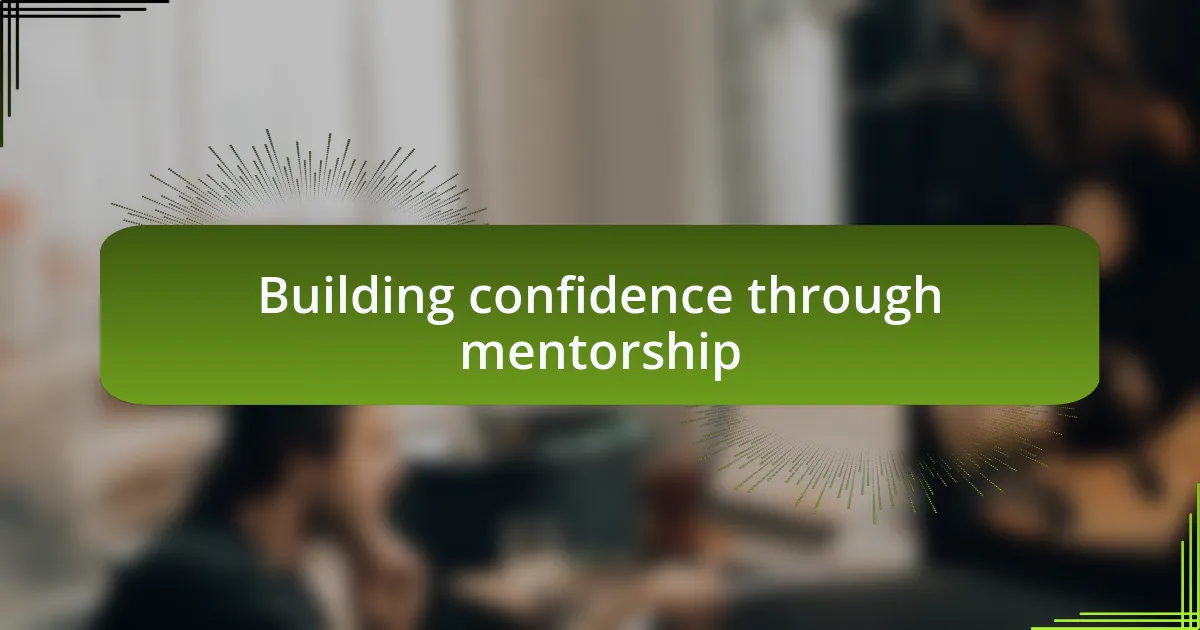Key takeaways:
- Imposter syndrome is common among high-achieving individuals, particularly in fields like engineering, where self-doubt can overshadow accomplishments.
- Sharing experiences and vulnerabilities with peers can foster a supportive environment, allowing individuals to realize they are not alone in their feelings.
- Mentorship plays a crucial role in building confidence, providing guidance, and normalizing fears related to performance and presentations.
- Common triggers for imposter syndrome include high expectations, transitions into new roles, and comparison with accomplished peers.

Understanding imposter syndrome
Imposter syndrome is an intricate psychological pattern where individuals doubt their accomplishments and fear being exposed as a fraud, despite evidence of their competence. I can recall a time early in my career when I led a project—an opportunity many would view as a success. Instead of celebrating, all I felt were nagging doubts. I constantly wondered, “What if my team believes I don’t belong here?” It’s perplexing how our minds can distort reality so convincingly.
This phenomenon often strikes those in high-achieving fields like engineering technology, where the pressure to excel can be intense. I’ve often talked to colleagues who, despite accolades and impressive resumes, still grapple with feelings of inadequacy. It made me ponder—why do we let these negative thoughts overshadow our achievements? Each time I realized these feelings weren’t unique to me, it was a small comfort, affirming that I wasn’t alone in this struggle.
Interestingly, imposter syndrome affects not just our self-esteem but also our performance. I remember a minor presentation where my palms were sweaty and my voice shaky, even with solid preparation. The fear of judgment was so potent that I questioned the validity of my ideas, as if a mere slip could unravel my status as a competent professional. Have you ever experienced that? It’s vital to recognize these feelings instead of letting them dictate our actions. Understanding this can be the first step in overcoming it.

Imposter syndrome in engineering field
Imposter syndrome is particularly pervasive in the engineering field, where the emphasis on technical competence can be overwhelming. I vividly recall a time when I was asked to mentor a group of interns. Instead of embracing the opportunity, I was paralyzed by the thought, “What if they ask me questions I can’t answer?” That nagging voice made me second-guess my qualifications, even though I had been in the industry for years.
It’s easy to see how this mindset can stall innovation, as talented engineers might hesitate to share their ideas or contribute in meetings. A colleague of mine hesitated to propose a groundbreaking solution during a critical project discussion for fear of being shot down. I often reflect on how our minds can become our most significant barriers. Why do we allow these unfounded fears to limit our potential in the field?
As I’ve navigated my own imposter feelings, I’ve learned that openness is key. I once shared my struggles in an informal gathering with peers, and the room erupted with laughter—similar experiences poured out. Those moments of vulnerability revealed that nearly all my colleagues dealt with these same feelings. Recognizing that these thoughts are widespread can be empowering; it transforms personal struggles into a communal journey. Have you noticed how sharing can lighten the burden? It reminded me that even in a competitive environment, we can uplift each other.

Common triggers in engineering careers
Certain situations in engineering careers can act as significant triggers for imposter syndrome. For instance, I remember attending a prestigious conference where I felt surrounded by brilliant minds. As I listened to experts share their cutting-edge research, a familiar insecurity crept in—“Am I really in the right place?” This moment of self-doubt intensified when I realized I had never presented my own work in such a setting, making me question my contributions to the field.
Another common trigger comes from the relentless pursuit of perfection. I often find myself in collaborative projects where I set impossibly high standards for my own performance. There was a time when I submitted an analysis report and feared backlash over small errors I identified after the fact. That constant comparison with my colleagues, many of whom I viewed as more accomplished, led me to feel inadequate even when I delivered satisfactory results. Have you ever felt that pressure to be perfect, and how has it affected your confidence?
Lastly, the transition into new roles or responsibilities can also ignite feelings of being an imposter. When I took on a managerial position for the first time, the responsibility weighed heavily on me. I questioned whether I could guide my team effectively, worried about their perception of my leadership abilities. Those initial days were filled with anxiety, but I realized that learning was part of the journey and seeking support from mentors helped me gain confidence. Isn’t it fascinating how growth often starts from moments of doubt?

Building confidence through mentorship
Finding a mentor in the engineering field can be a game-changer for building confidence. I remember connecting with a senior engineer who saw potential in me, despite my self-doubt. When they offered to guide me through project challenges, it felt incredibly reassuring; their belief in my capabilities encouraged me to take on tasks I would normally shy away from. Have you ever felt more capable simply because someone believed in you?
Mentorship not only promotes skill development but also helps in overcoming fear of failure. I once shared my anxiety about presenting in front of our engineering team with a mentor. They recounted their own experiences of flubbing presentations early in their career, which normalized my fear and made the future tasks seem less daunting. Hearing that vulnerability was eye-opening; it taught me that everyone makes mistakes. Does it surprise you how sharing struggles can foster a supportive atmosphere?
Moreover, mentors provide invaluable feedback that cultivates self-assurance. When I completed a challenging project, my mentor’s constructive criticism—paired with genuine praise—helped reshape my mindset. Their insights illuminated aspects of my work I hadn’t seen before, allowing me to view my contributions more positively. Has there been a moment when someone’s feedback changed your perspective on your skills?

Sharing experiences with peers
Sharing experiences with peers can profoundly impact how we perceive ourselves, especially when grappling with imposter syndrome. I recall a moment during a group project where I hesitated to voice my concerns about our design approach. Instead of brushing it off, I opened up to my colleagues about my insecurities. To my surprise, they shared similar feelings, and it became a bonding moment that not only eased my anxiety but also strengthened our team’s dynamic.
In a weekly study group, we often discuss our struggles and victories in the engineering courses we’re tackling together. One day, I shared how I felt out of my depth compared to my classmates, only to discover that several felt the same way. This honest exchange fostered an atmosphere of support, emphasizing that vulnerability can lead to genuine connection. Have you ever realized that others might be feeling the same way you do, just waiting for someone to speak up?
When I collaborated with peers on a particularly challenging project, I found that discussing our challenges opened doors to innovative solutions. One teammate admitted feeling intimidated by the complexity of the task, which prompted us to brainstorm strategies collectively. This dialogue not only alleviated individual pressure but also made the project feel more manageable. Have you encountered a situation where a simple conversation transformed your approach to a problem?